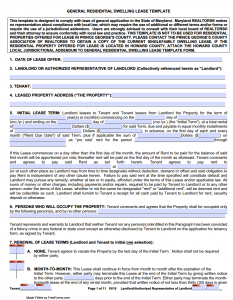
The Massachusetts lease agreement ordains the legal commitment of the acceptance of terms involved in the renting of residential or commercial space. The paperwork serves to cover all facets of the leasing plan, including names, property address, disclosures, unit policies, term, and payment schedule. The agreement holds each party accountable to the promises granted in the contract and protects from unnecessary liability issues.
Rental Application – When reviewing prospective tenants, it is advised to eliminate those individuals that are not eligible for selection—the questionnaire aids in the process of sifting through possible applicants. Examining the provided information will assist in finding a good fit for the property and the associated monthly payment for tenancy.

Massachusetts Association of Realtors Standard Residential Lease (Fixed Term) – The Realtors association that is stationed in Massachusetts has developed a form for use with residential properties leased within the state. This form covers the arrangement to rent a dwelling and records the transaction in express format for execution.
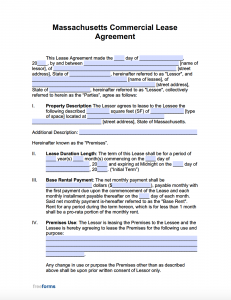
Commercial Lease Agreement – Consecrates the arrangement for a property owner to lease a property for the sole use of commercial endeavors.
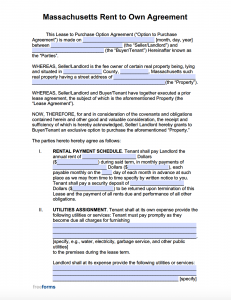
Lease to Own Agreement – Assigns a record to report the specific conditions for a person or entity to have the right to use a residence for a pinpointed time and financial dispensation. The contract extends the offer to purchase at the end of the term.
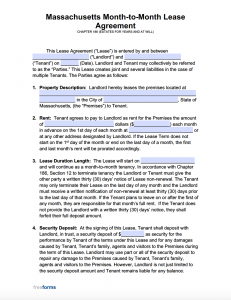
Month-to-Month Lease – Proposes the leasing settlement between a tenant and landlord with the option to terminate before lease end with thirty (30) day advisory.
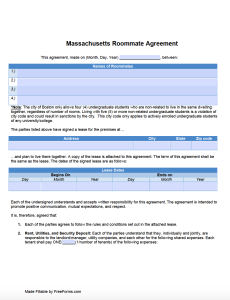
Roommate Agreement – Accredits signatory agreement to the terms of a lease allowing for a person to reside in a shared household for a given time in exchange for payment.
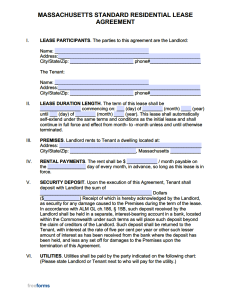
Standard Lease Agreement – Demonstrates the intrinsic commitments entailed int eh arrangement to lease a property for a signified duration period and payment amount.
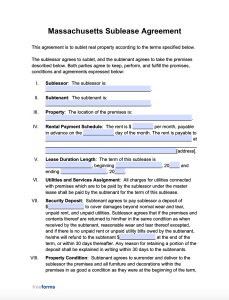
Sublease Agreement – Dispatches the leasing paperwork to solidify the arrangement for a tenant to take over a current tenant’s lease for a predetermined time and amount of money.
Review the Commonwealth of Massachusetts – Chapter 186 on Estates for Years and at Will/Landlord-Tenant Relationships. The covered legislature within the state’s online database provides an educational library of the legalities involving leased properties, and the rights of the owner and tenant.
Identification of the Landlord or Authorized Personel (Massachusetts Guide to Landlord/Tenant Rights ) – Any enforceable lease agreement is mandated to issue the names and addresses of the owner(s) and management for a property within the document.
Move-in Checklist ( § 186-15B) – Any residence that is rented with the requirement of a security deposit mandates the landlord to furnish a listing of the current property condition. The itemized account must be sent to the tenant with ten (10) days of lease commencement. The written register of the damages or defects must include the following language:
”This is a statement of the condition of the premises you have leased or rented. You should read it carefully in order to see if it is correct. If it is correct you must sign it. This will show that you agree that the list is correct and complete. If it is not correct, you must attach a separate signed list of any damage which you believe exists in the premises. This statement must be returned to the lessor or his agent within fifteen days after you receive this list or within fifteen days after you move in, whichever is later. If you do not return this list, within the specified time period, a court may later view your failure to return the list as your agreement that the list is complete and correct in any suit which you may bring to recover the security deposit.”
Receipt of Security Deposit ( § 186-15B) – A landlord is obligated to supply the tenant with a recorded document confirming the remitted payment as the security deposit.
Fire Insurance Information ( § 186-21) – Any tenant that requests details on the property’s fire insurance policy will require the landlord to deliver the specifics to the tenant. Lawfully, the owner must supply the information within fifteen (15) days of a request.
Lead-Based Paint (42 U.S. Code § 4852d ) – Information on the possibility of coming in contact with hazardous lead-based paint must be endowed to the tenant within the leasing paperwork. The educational packet describing the danger and warning signs is only required for houses built before 1979.
The amount of time in which a tenant is granted by law as a grace period to avoid late fees is thirty (30) days past the due date. Late fees can effectively be imposed on the thirty-first (31st) day ( § 186-15B).
Any charge to be incurred by the tenant based on a late monthly premium must be confirmed in the lease agreement to be legally supported. There is no state-maximum on the amount a landlord can charge as a late fee for payments received after the allocated thirty (30) day grace period ( § 186-15B).
Monthly lease payments made with a check from an account with insufficient funding may trigger a fee for each infraction. $30 is the most that an owner can charge in addition to any amassed banking fees. For an owner to rightfully collect a fee for a returned check, it must be included in the lease agreement ( § 62C-35).
The most that can be demanded as a security deposit for a unit is equal to one (1) month’s rent. Once the deposit is delivered, the owner must equip the tenant with a receipt of the full amount of the deposit, name of the person to receive it, and the date of the transaction ( § 186-15B).
Once the tenant has vacated the property, or the lease agreement has expired, the landlord then has 30 days to return the full amount to the tenant. If there is a physical issue with the premises caused by the lessee, each problem is to be notated. The notated list and corresponding damage cost is to be deducted from the total amount and returned to the tenant along with the report of the damage ( § 186-15B).
To gain access to the premises, the landlord must first notify the tenant of the reason, date, and time requested for entry. Although not explicitly proclaimed int the state statutes, it is recommended that the owner give at least twenty-four (24) hours of notification before entering.